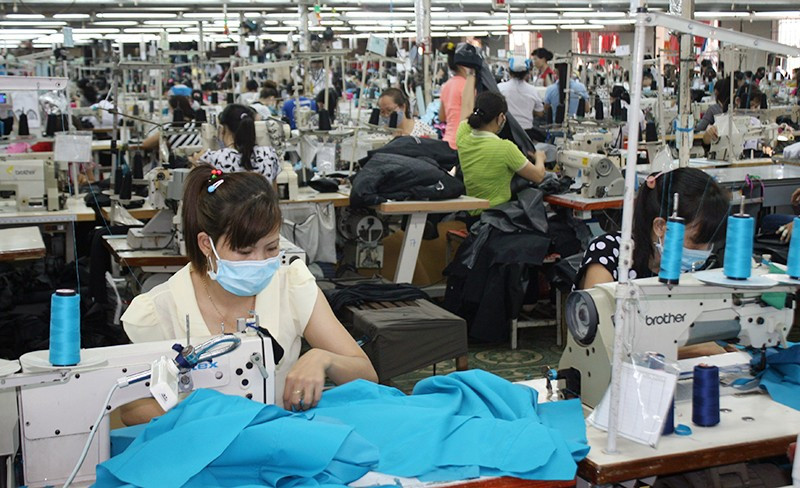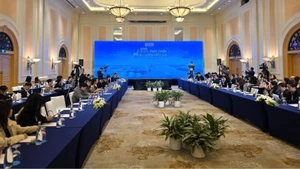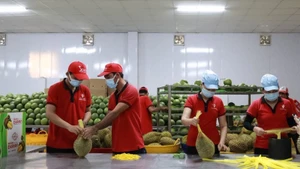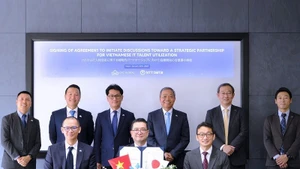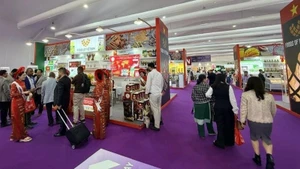Although the number of orders in the first months of the year has improved, the increase is not sustainable, with small orders, low prices, and high costs causing many difficulties for manufacturers.
Facing numerous risks
According to Nguyen Xuan Duong, Chairman of the Hung Yen Garment Company (Hugaco), the number of orders in the early months was relatively high but their prices were rather low, making it difficult for enterprises to sustain production. In addition, rising salary costs, raw material prices, and transport costs are also piling pressure on enterprises.
General Director of the Hoa Tho Garment Company Nguyen Van Hai shared that besides difficulties arising from geopolitical tension, the garment sector has to meet stricter requirements on sustainability from their customers. As such, orders in the early months have improved, but the rise is not sustainable with smaller orders and low prices.
On that basis, the company targets export revenue of 247 million USD in 2024 and aims to raise the average income for its employees by 6-10%. To fulfil such goals, the company will focus on various measures concerning markets, investment, human resources management, financial management, risk management, and digital transformation to enhance productivity and the quality of their products while retaining the workforce.
In 2024, the garment sector has also been affected by low purchasing power in major markets, increasing competition in workforce recruitment as more and more are looking for jobs overseas and in foreign-invested enterprises.
According to General Director of Garment 10 Corporation, in the coming time, the company will take a series of measures, including accelerating production speeds, improving product quality, saving costs in all activities, enhancing digital transformation, investing in key products, and supplementing highly-qualified personnel.
The corporation aims to reach revenue of 4,250 billion VND (167.2 million USD) with pre-tax profit of 115 billion VND (4.5 million USD) in 2024.
Enhancing competitiveness
Amid market uncertainties, garment companies have determined that it is necessary to implement various measures to boost export and growth. According to Nguyen Van Phong, General Director of the Hue Garment and Textile Company (Huegatex), the total garment demand is recovering slowly with small orders, lower prices, and stricter requirements on quality and compliance.
In this context, Huegatex has identified four key tasks: enhancing competitiveness and expanding markets; taking advantage of the garment supply chain; managing the money flows strictly while maintaining all resources and minimising losses; and improving the organisational model, workforce training, and digital transformation.
According to Vinatex Chairman Le Tien Truong, although difficulties and challenges continue in 2024, the market has seen positive changes. The garment market still has room for development for those with correct strategies and superior quality and productivity.
Vu Duc Giang, Chairman of the Vietnam Textile and Apparel Association (VITAS), warned that the global economy remains uncertain and challenges continue mounting on garment companies when more and more markets introduce mandatory requirements on human rights and environmental assessment in the supply chain, ecological design regulations, recycled products, and treatment of garment wastes.
Therefore, those wishing to join the global game must reshape themselves, make production more transparent, and ensure clear product origins and green development factors.
To realise the export goal of 44 billion USD, garment makers need to focus on key issues such as: continuing to diversify markets, partners and products; adopting sustainable development strategies that meet green requirements; and investing in digital management.
In addition, they should focus their investments in automation in some production lines, deliver high-quality goods at faster rates. They also need to take measures to develop the fashion industry, in which some Vietnamese brands should be promoted to the international market.
